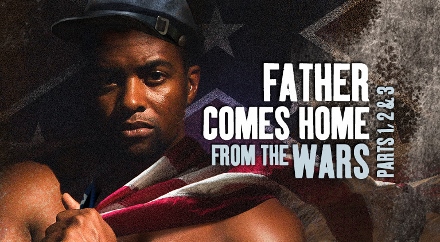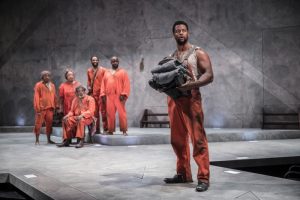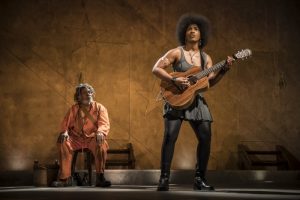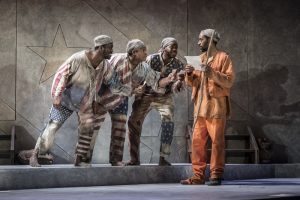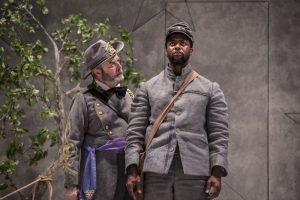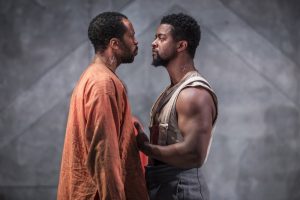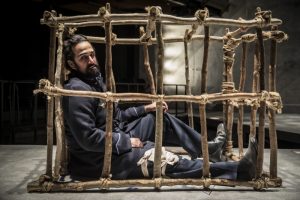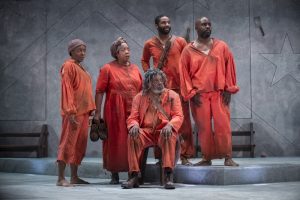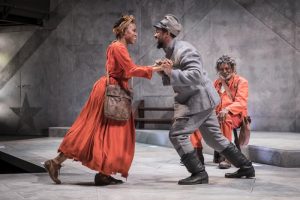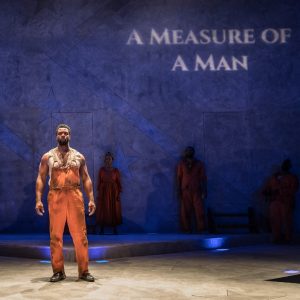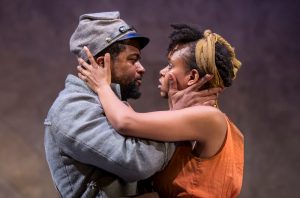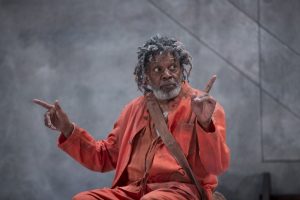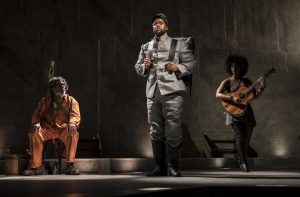THE UNCIVIL WAR
Goodman Theatre’s current epic won’t be confused with other dramas. It explores the Civil War as seen and suffered by the slaves. Not the usual perspective but it delivers a very broad canvas for Pulitzer Prize winner Suzan-Lori Parks. Running over three hours and requiring two intermissions, Father Comes Home from the Wars (Parts 1, 2 & 3) runs a storytelling marathon. The sprawling trilogy is driven by a plethora of pursuits: exposing truth without reconciliation; determining by process of elimination what’s true mastery and authentic bondage; and, above all, examining betrayal as it infects integrity and eviscerates love.
A Chicago premiere for Goodman Theatre, doggedly shaped by Niegel Smith, this 2014 repurposing of The Odyssey comes complete with commenting “Greek choruses.” (It equally references Stephen Crane’s The Red Badge of Courage, questioning bravery as an end in itself.) But it remains sui generis as it spins the cautionary tale of a reluctant soldier’s baptism in battle. Father centers on the ironically renamed Hero (magnificent Kamal Angelo Bolden), a Texas slave who, after much Hamlet-like indecision, will join his master to fight in the Confederate Army.
Performed against a symbolically bleached-out backdrop of Civil War iconography, Part 1: A Measure of a Man supplies just that: We discover the complicated contradictions of this maverick glory-seeker. Alluding to Ulysses’ Penelope, Hero is adored by his girl Penny (electrifying Aime Donna Kelly). He’s encouraged to be a warrior by The Oldest Old Man (avuncular Ernest Perry, Jr.), who believes combat is how men prove their worth whatever their skin. And he’s warily watched by his rival Homer (Jaime Lincoln Smith, effective as both storyteller and casualty).
Hero vacillates, at one point brainlessly threatening to cut off his foot to avoid service. (Homer, we learn, has lost his foot, punishment for an unsuccessful escape attempt.) Rapidly reversing opinions on whether Homer should fight for slavery or remain a chattel, The Chorus of Less Than Desirable Slaves (Jacqueline Williams, Sydney Charles, Ronald L. Conner, and Michael Aaron Pogue) provide a chattering commentary on the evolving situation, including the strange disappearance of Homer’s faithful dog. When they go beyond gossip to discover a terrible secret from Homer’s past (which by now should have been common knowledge on the plantation), Homer’s fate is sealed.
In Part 2: A Battle in the Wilderness, now wearing rebel gray, Homer is lost somewhere in the South with his owner the Colonel (William Dick, working overtime to achieve total vileness). This Dixie doodle comes off as a gratuitous caricature, a popinjay with a white plume who thanks heaven that he’s white. The “Peacock,” as Homer calls him, hopes to ransom Smith (the wonderful Demetrios Troy), a badly injured Union captain who’s confined to a wooden pen. Slowly learning how much he has in common with this supposed Yankee devil, Hero develops a yearning for a darker uniform.
Coming full circle, the last part, The Union of My Confederate Parts, brings us back to Ithaca — I mean, the Colonel’s estate — minus the owner but with a second chorus of Runaway Slaves (Bernard Gilbert, Nicole Michelle Haskins, and Tyrone Phillips). Much happens here — and the exposition and revelations are provided with magic-realism merriment by Homer’s returned Dog (BrittneyLove Smith), a silly sensation to say the least. For the sake of suspense, these may not be disclosed.
Fearful of Confederate “patrollers” (pointedly compared to America’s killing cops), the newly emancipated slaves plan a journey to freedom. When “father [finally] comes home from the wars,” it’s not the Homeric triumph of Odysseus’s joyful reunion with Penelope or his vanquishing of the squatting suitors. No, in all his pointless peregrinations Hero (a totally unearned name) has stolen only himself, his sole cause his own survival. Worse, Hero’s crime was to become his master. Now, alone with a dog who was far more faithful than he, Hero must bury the Colonel.
Though eloquent with folk wisdom and enriched by moving ballads written by Justin Ellington and sung by Melody Angel, Parks’ trilogy takes way too long to bring us home. Worse, Hero remains a pawn of his playwright, more symbol than soul. By the end the playwright delivers a not so enlightening condemnation of the wrong kind of emancipation. It’s the same bogus heroism and reflexive opportunism we see in Shakespeare’s Falstaff, Jaroslav HaÅ¡ek’s Good Soldier Schweik, Brecht’s Mother Courage, and Joseph Heller’s Yossarian. Some flaws never fade.
The plays’ most potent ingredient comes at the start but is never followed up. It’s the question of choice. By fighting to deny it to his fellow-slaves can Hero win any true freedom? In Parks’ busy play, treason takes many shapes: Exasperatingly or not, she refuses to nail down its causes. She’d rather examine its effects. After 200 minutes, we deserve more.
photos by Liz Lauren
Father Comes Home from the Wars (Parts 1, 2 & 3)
Goodman Theatre
Owen Theatre, 170 North Dearborn
ends on June 24, 2018
for tickets, call 312.443.3800 or visit Goodman
for more theater info, visit Theatre in Chicago
